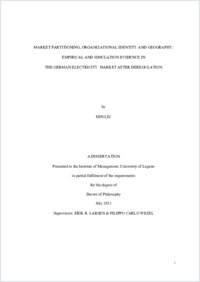Market partitioning, organizational identity and geography : Empirical and simulation evidence in the German electricity market after deregulation
- Liu, Min
- Larsen, Erik (Degree supervisor)
- Wezel, Filippo Carlo (Degree committee member)
-
22.08.2011
119 p
Thèse de doctorat: Università della Svizzera italiana, 2011 (jury note: summa cum laude)
Resource partitioning
Organizational identity
Geography
Categorization
Organizational ecology
Industrial evolution
English
This dissertation develops and tests theories on identity-based resource partitioning in the context of the German electricity market after deregulation in 1998. I apply insights from the recent theoretical development on organizational identity and pay special attention to the roles of audience heterogeneity which is observed through the lens of geography. Based on both theoretical arguments and field evidence, I detail the process of identity-based partitioning and explore three boundary conditions for sustaining an periphery identity oppositional to that of market leaders: intense cooperation among peripheral organizations, sufficient audience heterogeneity and short delays in enacting as well as in perceiving the periphery identity. I hypothesize that although increasing oppositional identities upon competitive release lead to resource partitioning, this effect varies substantially across audience segments embedded in geographical communities. Organizational founding rates increase with greater match between the peripheral identity and the values endorsed by the local community. I also propose while center organizations may absorb the majority of the released resources, competitive release leads to higher growth rates of peripheral organizations compared with those of the subsidiaries of the center ones. Combining the apparently opposing effects of the match between producer identity and audience tastes on founding rates and growth rates, I suggest that resource partitioning may occur both at the form level through new foundings and at the firm level through organizational growth, depending on the strength of the match. The theories and hypotheses are developed and tested using simulation experiments (chapter 2) and longitudinal quantitative data (chapter 3 and 4). This dissertation contributes to the theories on resource partitioning and organizational identity as well as to research on industrial evolution and sociology of market in general.
- Language
-
- English
- Classification
- Economics
- License
-
License undefined
- Identifiers
-
- RERO DOC 27096
- URN urn:nbn:ch:rero-006-110331
- ARK ark:/12658/srd1318384
- Persistent URL
- https://n2t.net/ark:/12658/srd1318384
Statistics
Document views: 348
File downloads:
- Texte intégral: 264
